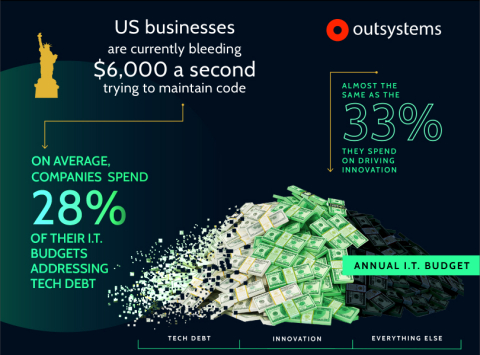Study Reveals Majority of IT Leaders Consider Technical Debt One of the Biggest Threats to Innovation as They Build Back
Study Reveals Majority of IT Leaders Consider Technical Debt One of the Biggest Threats to Innovation as They Build Back
New survey from OutSystems finds companies spend nearly one-third of IT budgets on technical debt
BOSTON--(BUSINESS WIRE)--OutSystems, a global leader in modern application development, today reported that 69% of IT leaders identify technical debt as a major threat to their companies’ ability to innovate, as seen in its latest report, “The Growing Threat of Technical Debt.” With COVID-19 exposing vulnerabilities in organizations around the world, this latest industry survey from OutSystems examines the cost of technical debt facing businesses across industries and geographies.
“The combination of old code along with the new generation of mobile apps, stack applications, and SaaS sprawl are robbing organizations of resources, time, and the ability to innovate,” said Paulo Rosado, CEO and Founder of OutSystems. “This report proves that technical debt will continue to compound, and requires a new approach to move past it and innovate at a pace and scale for true competitive advantage.”
As businesses strive to rebuild following the challenges of the past year, technical debt has emerged as a major roadblock to innovation and recovery, especially for enterprises focused on growth. Technical debt is a technical design or development choice made for short-term benefit with long-term consequences. Across industries, this results from the development of solutions implemented quickly to maximize speed, rather than optimizing for the future.
Based on a global survey of 500 IT leaders, the OutSystems report highlights the challenges companies face as they confront the many causes of technical debt, including pressure to meet deadlines, constant change in the marketplace, and outdated technology.
Key findings of the report include:
- A majority (69%) of IT leaders say technical debt poses a fundamental limit on their ability to innovate, along with 61% saying it drags on their company’s performance and 64% agreeing it will continue to have a major impact in the future.
- There is a massive opportunity cost for businesses of all sizes across all industries as they dedicate time, money, and other resources into technical debt instead of innovation. On average, businesses spend approximately one-third of their IT budget addressing technical debt - this jumps to 41% for enterprises.
- There isn’t a sole cause of technical debt, though IT leaders cite too many development languages/frameworks (52%), turnover within the development team (49%), and accepting known defects to meet release deadlines (43%).
- Businesses continue to delay addressing technical debt, further exacerbating the issue. Only 20% say tech debt is something they’re currently managing well, though 36% report they’ll be able to manage tech debt in the future.
- Technical debt compounds as companies grow. Enterprises spend 41% of their IT budget on technical debt, while small businesses spend 27%.
“Technical debt can be particularly costly in the financial services industry, where companies thrive on their ability to innovate while providing fast and reliable services,” said Izak Joubert, JTC Group CTO. “Within JTC Americas, we’ve worked with OutSystems for years to develop software products that streamline financial transactions for our customers. They’ve helped us move beyond concerns about technical debt so we can focus on creating software that is predictable and secure as well as quick and easy to update.”
“For years we’ve seen the negative impact of technical debt on businesses' ability to prioritize innovation and flexibility, which are critical elements to gaining and maintaining a competitive edge,” said Rui Gonçalves, Partner at KPMG in Portugal. “Through the longstanding partnership between KPMG and OutSystems, we’ve witnessed the significant capabilities that modern application development offers in terms of eliminating technical debt as well as empowering businesses to shift their resources toward innovation in a meaningful, successful way.”
Methodology
Findings in “The Growing Threat of Technical Debt” are based on a global survey of 500 IT leaders spanning enterprises, commercial companies, and small businesses around the globe. Fielded in partnership with Lucid, the online survey was conducted in May 2021 across the United States, Australia, the United Kingdom, France, Germany, Portugal, India, Brazil, the United Arab Emirates, and Singapore. Respondents span industries including finance, retail, healthcare, education, business services, government and public administration, media and telecommunications, utilities, and real estate.
To find out more about how and where technical debt is affecting business and IT leaders around the world, visit stoptechdebt.com or download the full report here.
About OutSystems
OutSystems was founded in 2001 with the mission to give every organization the power to innovate through software. The OutSystems modern application platform’s high productivity, connected, and AI-assisted tools help developers rapidly build and deploy a full range of applications anywhere the organization requires. With more than 435,000 community members, more than 1,500 employees, 350 partners, and active customers in 87 countries and across 22 industries, OutSystems has achieved global scale while helping organizations change the way they develop applications. Visit us at www.outsystems.com or follow us on Twitter @OutSystems or LinkedIn at https://www.linkedin.com/company/outsystems.
Contacts
Media Contacts:
Ann Conrad, OutSystems
ann.conrad@outsystems.com
or
Kelsey Williams
outsystems@strangebrewstrategies.com

